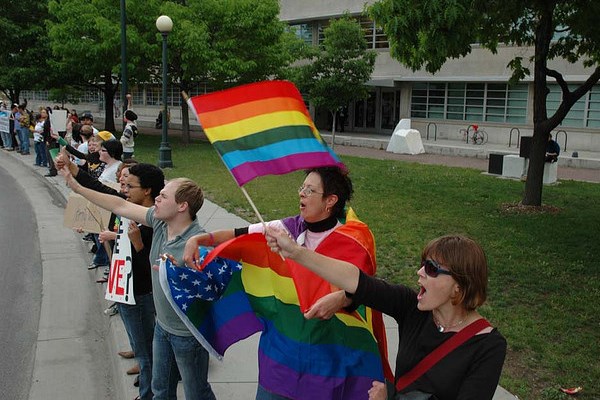Two Ways Not to React to the LGBT Movement
Written by Jedd Cole
Proponents of homosexual rights scored a huge win with the recent SCOTUS ruling, while in South Korea protesters harassed gay marchers. Is anyone right?
 The recent Supreme Court decision in favor of same-sex marriage sparked widespread celebration on the streets and on social media in the United States, where public opinion supporting same-sex marriage has grown in recent years.
The recent Supreme Court decision in favor of same-sex marriage sparked widespread celebration on the streets and on social media in the United States, where public opinion supporting same-sex marriage has grown in recent years.
Things were a bit different in South Korea.
At the end of this year’s Queer Cultural Festival in Seoul, South Korea, the Korea Herald reports that “festival participants were outnumbered by the anti-gay activists who staged protests in the event venue, holding signs with slogans like ‘Stop Same-Sex Marriage’ and ‘Gays Out: Homosexuals have no human rights’” (“After Long Fight, LGBT Activists Parade in Seoul,” June 28, 2015).
In the weeks leading up to the festival, Christian groups deliberately flooded the police with permit applications to book up likely venues for the festival’s closing day parade. Their efforts jammed up the permit process and led to a police ban on the parade altogether for safety concerns, according to Seoul-based correspondent Elise Hu of NPR News. Another contingent camped out in front of the police station to block parade organizers from even applying.
A Korean court overturned the ban, but event organizers still had to warn participants to beware of “flying objects, long stalls along the route and other potential safety hazards” that they’ve experienced in the past (“A Showdown Looms at South Korea’s Gay Pride Parade,” NPR.org, June 26, 2015).
Surely this kind of conflict is hardly what Christians should be known for! But let’s unpack these scenarios a bit more.
Two reactions to the LGBT movement
While there are people of many shades of persuasion and opinion engaged in both of these events, we could say these two cases represent opposite ends of a reaction spectrum toward the movement to legitimize homosexual, bisexual and transgender lifestyles.
United States: Acceptance and approval of homosexuality, which the Bible repeatedly describes as sin (1 Corinthians 6:9-10; Leviticus 20:13).
South Korea: Open contempt for homosexuals, using aggressive and hateful language and in some cases provoking conflict.
Who’s in the right here? Using the Bible as a guide, it becomes clear that neither extreme is what God wants. What qualities should describe our reactions?
· Not acceptance, but obedience.
Obedience, that is, to God and His law, which is designed for the ultimate good of all human beings (Deuteronomy 10:13). This law very clearly precludes behaviors such as lust, extramarital sex and homosexuality, among others that ultimately cut to the core of why humans suffer and why they mistreat one another (James 4:1-4). Living the way God directs brings satisfaction and fulfillment of a kind no sin can offer (Deuteronomy 28:1-13); and that’s why it’s so important not to approve of or accept what is sin, but reject it in humble submission to God, the Lawgiver (James 4:12). The New Testament shows some in the early Church had rejected this lifestyle and begun obeying God (1 Corinthians 6:9-11).
· Not contempt, but compassion.
It was toward the self-righteous Pharisees that Jesus Christ showed His anger (Matthew 23:13). To other sinners, Christ showed a constantly loving yet never-compromising attitude, instructing them sincerely to repent of their sins (John 8:11). When the apostle Paul approached the largely pagan intellectuals of Athens, he did not condemn, but rather used his understanding of their point of view to bring them to the wonderful truth of God’s way (Acts 17:22-31). Likewise, God desires that we lay aside “all malice, all deceit, hypocrisy, envy and all evil speaking” (1 Peter 2:1), which the Bible actually groups right alongside sexual immorality (Galatians 5:19-21)!
To put these two together, we are to never compromise with sin. The apostle Paul used strong words to describe the perverse nature of what is today considered an “alternative lifestyle” and other types of sins (Romans 1:27-29). But neither he nor Jesus Christ advocated outright contempt and physical aggression against the people who are caught in these sins.
A better way
The Bible shows us a better way: godly love. But don’t assume you know what this love really is. This kind of love isn’t a feeling or a slogan, but a way of life. This kind of love is genuinely concerned with the eternal welfare of all human beings; this love is patient, kind, humble; this love doesn’t approve of sin, but of truth (1 Corinthians 13:4-6).
Don’t fall into the camp of those who unwittingly celebrate what is sin. Test things against God’s standard and hold fast to what is good and pure (1 Thessalonians 5:21).
By the same token, avoid those who show no self-control over their malice. Seek to understand what other people are going through before responding. Oppose the sin, but try to show love and kindness to the sinner.
For further insight into the recent Supreme Court decision, read “#LoveWins or #TruthLoses? What Today’s Supreme Court Decision Really Means.”
Jedd Cole is a professional editor, blogger and author. He attends the Cincinnati/Dayton, Ohio, congregation of the Church of God, a Worldwide Association.
Photo by Daniel Gonzales / Soulforce, Creative Commons Attribution 3.0 license










